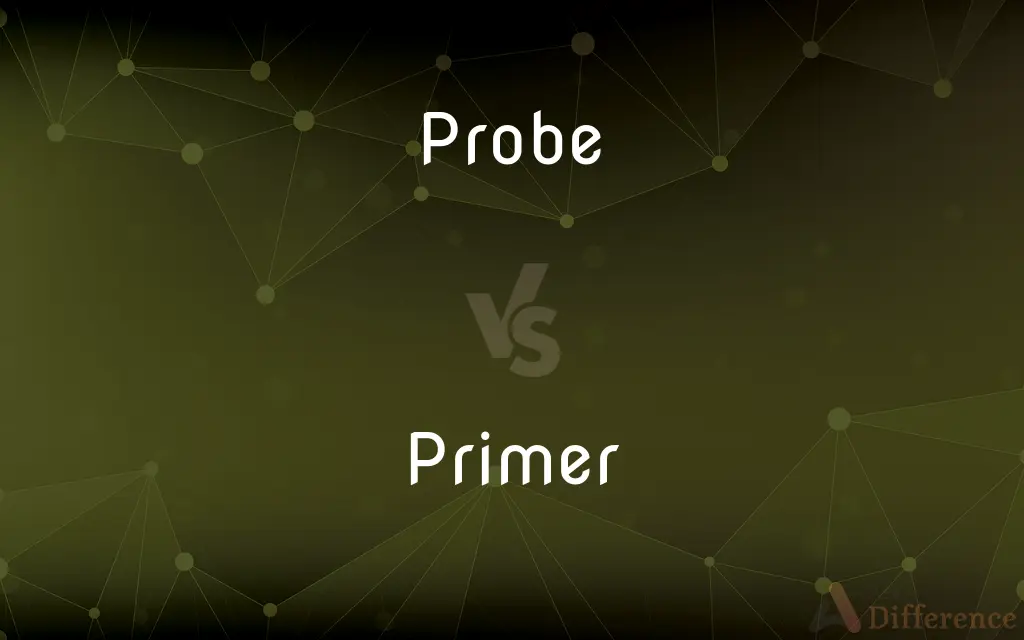Probe vs. Primer — What's the Difference?
By Urooj Arif & Maham Liaqat — Updated on April 18, 2024
Probe is a molecule used to detect or measure other substances, often used in diagnostics, while a primer is a short nucleic acid sequence that initiates DNA synthesis in PCR techniques.

Difference Between Probe and Primer
Table of Contents
ADVERTISEMENT
Key Differences
A probe is a general term for a molecule designed to bind to a specific sequence of DNA, RNA, or protein to facilitate detection or quantification. While primers, specific to molecular biology, are short strands of nucleic acid that serve as starting points for DNA synthesis during polymerase chain reactions (PCR).
Probes are commonly labeled with fluorescent or radioactive markers to visualize the binding event, which is crucial for diagnostic tests such as those used in medical labs to detect diseases. On the other hand, primers are not labeled because their main function is to anneal to a specific DNA sequence and extend new DNA strands, not to be detected themselves.
In various scientific assays, probes are used to confirm the presence or absence of a target sequence or to measure its quantity within a sample. Whereas primers are used primarily in DNA amplification techniques, making them indispensable in genetic testing, cloning, and sequencing applications.
Probes can be designed to bind to specific nucleic acid sequences without initiating a polymerase reaction, which makes them useful in hybridization assays like FISH (Fluorescent In Situ Hybridization). In contrast, primers are specifically designed to work with DNA polymerases, initiating the synthesis of a new DNA strand complementary to the target DNA sequence.
While probes provide real-time data and can be used in living cells to study dynamic biological processes, primers are typically used in vitro in a more controlled, artificial setting to amplify DNA for further analysis or manipulation.
ADVERTISEMENT
Comparison Chart
Definition
A molecule that binds specifically to detect others
A short nucleic acid sequence initiating DNA synthesis
Usage
Diagnostic tests, research
PCR, DNA sequencing
Composition
Often labeled with markers
Unlabeled, consists of nucleotides
Function
Detection and quantification
DNA synthesis initiation
Application Environment
Can be used in vivo or in vitro
Primarily used in vitro
Compare with Definitions
Probe
A device or substance used for analysis or detection.
A fluorescence probe was used to track the changes in cell activity.
Primer
A small segment of DNA or RNA used to start synthesis.
The primer attached to the target DNA strand, initiating replication.
Probe
An investigative tool in molecular biology.
The probe's hybridization confirmed the gene's presence in the sample.
Primer
First in order of reading or presentation.
The primer lesson is always the foundation of the curriculum.
Probe
A question or inquiry into a matter.
The journalist's probe into the scandal uncovered new facts.
Primer
An introductory textbook.
The chemistry primer covered all the basics needed for the course.
Probe
An instrument for examining or testing.
The probe entered the tissue, collecting vital diagnostic information.
Primer
A substance used to prepare a surface for painting.
The painter applied a primer before the final coat to ensure better adhesion.
Probe
A space probe used for exploring outer space.
The Mars probe sent back valuable data about the planet's surface.
Primer
A cap or device that detonates an explosive.
The bullet's primer was struck, igniting the gunpowder.
Probe
A blunt-ended surgical instrument used for exploring a wound or part of the body.
Primer
A substance used as a preparatory coat on wood, metal, or canvas, especially to prevent the absorption of subsequent layers of paint or the development of rust
Apply three coats of primer
New plaster should be treated with a primer
Probe
A thorough investigation into a crime or other matter
A probe into city hall corruption
Primer
A cap or cylinder containing a compound which responds to friction or an electrical impulse and ignites the charge in a cartridge or explosive
The nitro-cellulose is ignited by the spark that comes from the primer
Probe
An unmanned exploratory spacecraft designed to transmit information about its environment.
Primer
A small pump for pumping fuel to prime an internal combustion engine, especially in an aircraft
No more than four pumps of the primer usually suffice
Probe
A projecting device for engaging in a drogue, either on an aircraft for use in in-flight refuelling or on a spacecraft for use in docking with another craft.
Primer
A molecule that serves as a starting material for a polymerization process
The duplex RNA primer cannot initiate DNA replication
Probe
Physically explore or examine (something) with the hands or an instrument
Hands probed his body from top to bottom
Primer
An elementary textbook that serves as an introduction to a subject of study or is used for teaching children to read
A first-year philosophy primer
Probe
A slender, flexible surgical instrument used to explore a wound or body cavity.
Primer
An elementary textbook for teaching children to read.
Probe
An electrode or other device that can be placed inside something to take and convey measurements.
Primer
A book that covers the basic elements of a subject.
Probe
A substance, such as DNA, that is radioactively labeled or otherwise marked and used to detect or identify another substance in a sample.
Primer
A cap or tube containing a small amount of explosive used to detonate the main explosive charge of a firearm or mine.
Probe
A space probe.
Primer
An undercoat of paint or size applied to prepare a surface, as for painting.
Probe
An exploratory action or expedition, especially one designed to investigate and obtain information on a remote or unknown region
The scouts' probe of enemy territory.
Primer
(Genetics) A segment of DNA or RNA that is complementary to a given DNA sequence and that is needed to initiate replication by DNA polymerase.
Probe
The act of exploring or searching with a device or instrument
The surgeon's probe of the clogged artery.
Primer
A prayer or devotional book intended for laity, initially an abridgment of the breviary and manual including the hours of the Virgin Mary, 15 gradual and 7 penitential psalms, the litany, the placebo and dirige forming the office of the dead, and the commendations.
Probe
An investigation into unfamiliar matters or questionable activities; a penetrating inquiry
A congressional probe into price fixing.
A reporter's probe into a public figure's past.
Primer
Any of various similar works issued in England for private prayer in accordance with the Book of Common Prayer.
Probe
To penetrate or explore physically, especially with a probe, in order to find or discover something
"Chimpanzees use a variety of tools to probe termite mounds" (Virginia Morell).
Primer
A children's book intended to teach literacy: how to read, write, and spell.
Probe
To investigate by means of a chemical probe.
Primer
An introductory text on any subject, particularly basic concepts.
Probe
To make an inquiry about (something); investigate or examine
Probed the impact of technology on social behavior.
Primer
(New Zealand) An elementary school class; an elementary school student. (No longer used.)
Probe
To subject (a person) to questioning; interrogate.
Primer
Any substance or device, such as priming wire or blasting cap, used to ignite gunpowder or other explosive.
Probe
To make a physical search, especially by penetrating with a probe
Birds probing in the sand for clams.
Primer
A person who primes explosives.
Probe
To pose questions or conduct an investigation
The police are probing into what really happened.
Primer
A substance used to prime wood, metal, etc. in preparation for painting.
Probe
(surgery) Any of various medical instruments used to explore wounds, organs, etc.
Primer
A layer of such a substance.
Probe
(figuratively) Something which penetrates something else, as though to explore; something which obtains information.
Primer
A layer of makeup that goes beneath the foundation; undermakeup.
Probe
An act of probing; a prod, a poke.
Primer
A person who primes wood, metal, etc.
Probe
(figuratively) An investigation or inquiry.
They launched a probe into the cause of the accident.
Primer
A molecule which initiates the synthesis of an enzyme, (especially) a single-stranded nucleic acid molecule which initiates DNA replication.
Probe
(aeronautics) A tube attached to an aircraft which can be fitted into the drogue from a tanker aircraft to allow for aerial refuelling.
Primer
A pheromone which interacts first with the endocrine system.
Probe
(sciences) A small device, especially an electrode, used to explore, investigate or measure something by penetrating or being placed in it.
Insert the probe into the soil and read the temperature.
Primer
A device used to prime an internal combustion engine with gasoline, (especially) in airplanes.
Probe
(astronautics) A small, usually unmanned, spacecraft used to acquire information or measurements about its surroundings.
Primer
A person who prunes trees.
Probe
(game of go) a move with multiple answers seeking to make the opponent choose and commit to a strategy
Primer
(obsolete) First in time, initial, early.
Probe
(biochemistry) Any group of atoms or molecules radioactively labeled in order to study a given molecule or other structure
Primer
(obsolete) First in importance, premier.
Probe
(ambitransitive) To explore, investigate, or question
If you probe further, you may discover different reasons.
Primer
First in position, foremost.
Probe
(transitive) To insert a probe into.
Primer
One who, or that which, primes
Probe
To examine, as a wound, an ulcer, or some cavity of the body, with a probe.
Primer
Originally, a small prayer book for church service, containing the little office of the Virgin Mary; also, a work of elementary religious instruction.
The primer, or office of the Blessed Virgin.
Probe
Fig.: to search to the bottom; to scrutinize or examine thoroughly.
The growing disposition to probe the legality of all acts, of the crown.
Primer
A small elementary book for teaching children to read; a reading or spelling book for a beginner.
As he sat in the school at his prymer.
Probe
An instrument for examining the depth or other circumstances of a wound, ulcer, or cavity, or the direction of a sinus, of for exploring for bullets, for stones in the bladder, etc.
Primer
A kind of type, of which there are two species; one, called long primer, intermediate in size between bourgeois and small pica [see Long primer]; the other, called great primer, larger than pica.
Probe
An inquiry into unfamiliar or questionable activities;
There was a congressional probe into the scandal
Primer
First; original; primary.
Probe
A flexible slender surgical instrument used to explore wounds or body cavities
Primer
An introductory textbook
Probe
An exploratory action or expedition
Primer
Any igniter that is used to initiate the burning of a propellant
Probe
An investigation conducted using a probe instrument
Primer
The first or preliminary coat of paint or size applied to a surface
Probe
Question or examine thoroughly and closely
Probe
Examine physically with or as if with a probe;
Probe an anthill
Common Curiosities
What is a probe used for in medical settings?
In medicine, a probe is used to investigate and diagnose conditions within the body, often through imaging or direct examination.
How do probes function in scientific research?
Probes in research collect data or samples to analyze aspects of physical or environmental conditions.
How are primers used in molecular biology?
In molecular biology, primers are used to start the synthesis of DNA strands during processes like PCR.
What is the purpose of a primer in painting?
A primer prepares the painting surface, enhancing paint adherence and extending the durability of the paint job.
What distinguishes a probe from a primer in practical terms?
Probes are tools for gathering information, while primers are substances that prepare or initiate processes.
Can primers be used in industries other than painting and biology?
Yes, primers are also used in cosmetics to prepare the skin and in ammunition to initiate the firing process.
Can the term "probe" refer to anything other than a physical tool?
Yes, "probe" can also refer to any investigation or detailed inquiry.
What is the significance of a primer in cosmetic use?
In cosmetics, a primer is used to smooth the skin and create an even base for makeup application.
How do primers enhance the effectiveness of makeup?
Primers help makeup apply more smoothly and last longer by creating an even surface.
Are probes used in industries outside of medicine and science?
Yes, probes are also used in fields like engineering and technology for monitoring and diagnostic purposes.
Share Your Discovery

Previous Comparison
Enterprise vs. Company
Next Comparison
Agglutination vs. CoagulationAuthor Spotlight
Written by
Urooj ArifUrooj is a skilled content writer at Ask Difference, known for her exceptional ability to simplify complex topics into engaging and informative content. With a passion for research and a flair for clear, concise writing, she consistently delivers articles that resonate with our diverse audience.
Co-written by
Maham Liaqat














































